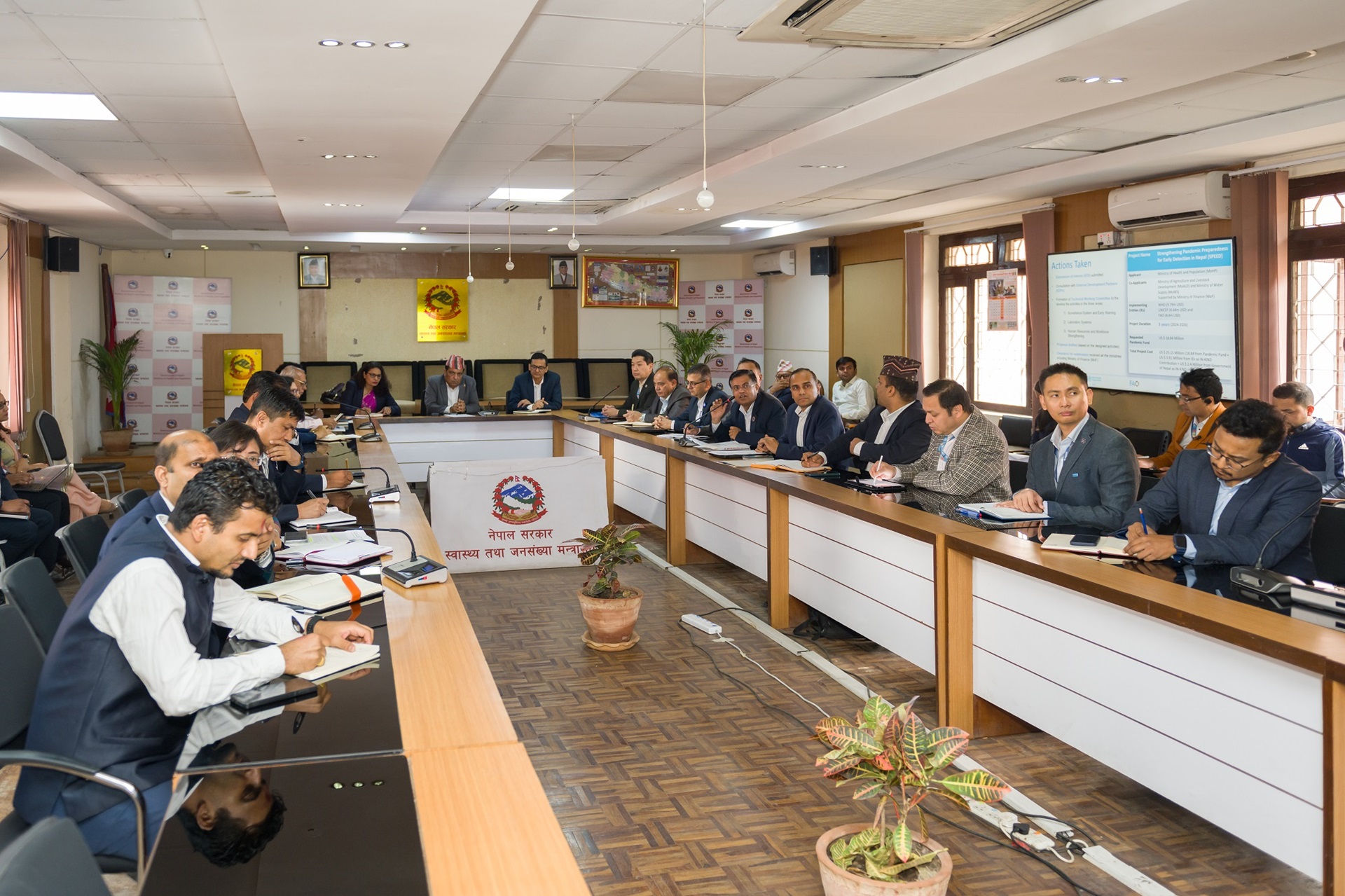Background

The launch of the Strengthening Pandemic Preparedness for Early Detection (SPEED) project at the premises of the Ministry of Health and Population, Bagmati Province, Nepal
Nepal, a landlocked country situated between India and China, is particularly vulnerable to earthquakes, river floods and epidemics (INFORM Risk Country Profile, 2022). Its open borders, frequent population movements and a growing tourism industry contribute to the increased risk of cross-border transmission of infectious diseases.
In recent years, Nepal has experienced several infectious disease outbreaks, including influenza, COVID-19, cholera, diarrhoea, dengue and measles. Influenza causes seasonal outbreaks annually, and in 2019, the country reported a human case of Avian Influenza A/H5N1. Various strains of Influenza A virus continue to affect poultry. Nepal’s rich biodiversity and increased human-animal interactions provide a conducive environment for the emergence of pathogens with epidemic or pandemic potential. In 2023, the country also detected its first case of Mpox.
The 2023 National Strategic Toolkit for Assessing Risks (STAR) workshop identified and assessed 23 specific hazards that fall under 11 subgroups of hazards, including respiratory pathogens, vector-borne diseases, viral hemorrhagic fevers, faeco-oral diseases, zoonotic infections and other infectious threats. These findings are based on input from the participants, the multisectoral experts, through a discussion-based consensus-building process that used existing data and emergency response expertise.
Nepal has outlined priority actions to strengthen three core capacities under the International Health Regulations 2005 (IHR 2005): surveillance, the national laboratory system and human resources. These priorities are informed by evaluations such as the Joint External Evaluation (JEE, 2022), the PVS Gap Analysis (2011) and the Performance of Veterinary Services (PVS, 2008).
Project summary
The three-year project “Strengthening Pandemic Preparedness for Early Detection in Nepal (SPEED)” was approved by Nepal’s Cabinet on 18 April 2024. The project will be jointly implemented by FAO, UNICEF and WHO, i.e., 3 Implementing Entities (IEs) in coordination with their respective government counterparts: the Ministry of Agriculture and Livestock Development, the Ministry of Water Supply, and the Ministry of Health and Population (MoHP). As the lead agency, the MoHP has established both a steering committee and a technical committee to guide implementation. In addition, a Project Implementation Unit (PIU) has been formed to facilitate coordination.
SPEED aims to enhance Nepal’s capacity in three core areas of the IHR 2005, contributing to a resilient, sustainable and robust health security architecture equipped to detect and respond to future pandemics while minimizing their health, social and economic impacts.
The Pandemic Fund’s US$ 18.8 million grant, along with an additional US$ 3.9 million in co-financing and US$ 2.3 million in co-investment, will support the partnership between the Government of Nepal and the three IEs to strengthen Nepal’s pandemic prevention, preparedness and response (PPR) efforts.
Of the total grant, WHO received US$ 9.1 million from the Pandemic fund and will contribute US$ 1.7 million in co-financing to support project implementation.
/countries/nepal/project-lead-agency_ss_sga_5-march.tmb-1920v.jpg?sfvrsn=4bf08c5b_5)
Project objectives
The SPEED project aims to strengthen Nepal’s surveillance, laboratory system and human resources for a strong, resilient and sustainable health security system.
Key components
All three IEs are supporting elements of all three components of the project (mentioned below). WHO Nepal will implement the project activities in close collaboration with the MoHP and relevant divisions of the Department of Health Services.
Building capacity in surveillance and early warning systems
SPEED will strengthen capacity for bacterial culture to support antimicrobial resistance (AMR) surveillance, establish linkages between points of entry and the national surveillance system, and operationalize an alert and response framework for effective call centers, media scanning, and community-based and hospital/laboratory-based surveillance. It will also enhance the digital platform for data sharing, develop risk assessment frameworks, operationalize rapid response teams at the federal, provincial, and local levels, and initiate community-based surveillance.
SPEED will further build the capacity of animal health personnel in disease recognition, reporting and surveillance data analysis. It will also develop water quality and environmental surveillance mechanisms.
Improving laboratory Systems
In both human and animal health sectors, SPEED will strengthen provincial and local laboratory capacity for sample collection, referral, transportation and quality assurance. It will develop a national laboratory quality assurance framework, standardize licensing and reporting mechanisms, facilitate accreditation of priority laboratories and conduct regular simulation exercises. Protocols will also be developed to support genomic sequencing capacity.
For water quality and wastewater testing, the project will assess current capacity, map existing laboratories (public and private), develop protocols for sample collection and testing and build laboratory capabilities. An information management system will be established to support data handling in these laboratories.
Strengthening human resources and workforce
SPEED will assess current workforce capacity, build capacity for rapid response teams, develop strategic roadmaps for Field Epidemiology Training Programmes and conduct competency-based training programmes for field practitioners and laboratory staff.
In the animal health sector, SPEED will support training programmes for veterinarians and establish field veterinary epidemiology programmes. It will also support simulation exercises to strengthen early detection and response systems related to water quality and wastewater monitoring and surveillance.Expected outcomes
Increased JEE, PVS and SPAR scores for surveillance, laboratory and workforce and the health, social and economic impact of potential outbreaks/epidemics reduced, especially for the most marginalized and vulnerable subgroups with more timely detection, notification and response in Nepal.
Key achievements till December 2025
Surveillance and early warning systems
Laboratory systems
Human resources and workforce
Note: The achievement data will be regularly updated as new developments are completed.
Related news
Related links
For More Information
Country Office Focal Point
Dr Allison Gocotano
Team Leader
WHO Health Emergencies Programme
Email: gocotanoa@who.intProject Focal Point
Dr Dipendra Gautam
National Professional Officer, International Health Regulations
WHO Health Emergencies Programme
Email: gautamd@who.int

/countries/nepal/slide53dc9629f-ba5a-4cd9-afe3-25d05680255f.tmb-1920v.jpg?sfvrsn=d196351f_4)
/countries/nepal/slide8bd8a9ae7-51a4-4915-8e84-dc00fa391c71.tmb-1920v.jpg?sfvrsn=970a69d_6)
/countries/nepal/slide1200916987-3ff4-459d-bdb3-f8d17df091eb.tmb-1920v.jpg?sfvrsn=48b9080a_4)
/countries/nepal/slide6f297d88b-dfc9-4e59-beb4-8edf5697acf6.tmb-1920v.jpg?sfvrsn=1dc0f341_6)
/countries/nepal/slide9.tmb-1920v.jpg?sfvrsn=826b1970_6)
/countries/nepal/slide15.tmb-1920v.jpg?sfvrsn=38f311a1_4)
/countries/nepal/slide7c4efa2cf-9784-4357-8868-52dc80b27821.tmb-1920v.jpg?sfvrsn=7f84d5f9_5)
/countries/nepal/slide10.tmb-1920v.jpg?sfvrsn=1291c44d_5)
/countries/nepal/slide17.tmb-1920v.jpg?sfvrsn=1a51bdc8_1)
/countries/nepal/slide1e241df29-cf43-4bcf-bc1a-63619449c98b.tmb-1920v.jpg?sfvrsn=70a11c4e_4)
/countries/nepal/slide4e09eb3de-f28c-4363-b3a9-23e1aa1500f3.tmb-1920v.jpg?sfvrsn=a400ec19_3)
/countries/nepal/slide800404f7d-722d-444b-9b4a-6a4f3e99b73a.tmb-1920v.jpg?sfvrsn=8c9f059b_2)
/countries/nepal/slide2fa5f88b0-e4cc-4cf5-986a-96781c8d58d5.tmb-1920v.jpg?sfvrsn=ae810e30_4)
/countries/nepal/slide44c7617bc-aa4c-4f00-a341-29ea922958fe.tmb-1920v.jpg?sfvrsn=2ec1228b_7)
/countries/nepal/slide62d3ec941-6e11-471a-b549-f01472474e6a.tmb-1920v.jpg?sfvrsn=a7d31589_2)
/countries/nepal/slide39be7bfe4-2eb5-4a1c-973d-17077ad4e77f.tmb-1920v.jpg?sfvrsn=40806507_4)
/countries/nepal/slide73a59de70-a8bc-4316-91f2-cc46c021a427.tmb-1920v.jpg?sfvrsn=bed65802_2)
/countries/nepal/slide12.tmb-1920v.jpg?sfvrsn=3c75bfbe_5)
/countries/nepal/slide14.tmb-1920v.jpg?sfvrsn=edb6e0e4_3)
/countries/nepal/slide19.tmb-1920v.jpg?sfvrsn=6317c03e_4)
/countries/nepal/slide11.tmb-1920v.jpg?sfvrsn=62ea3cb0_6)
/countries/nepal/slide13.tmb-1920v.jpg?sfvrsn=bcbd2a0b_6)
/countries/nepal/slide1965fb4d44-0734-42bf-886a-d72002d49c84.tmb-1920v.jpg?sfvrsn=e4a81ebb_1)
/countries/nepal/slide18.tmb-1920v.jpg?sfvrsn=6e59c895_4)